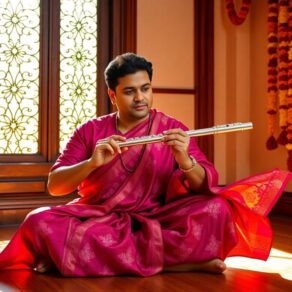Jean-Pierre Rampal revolutionized the perception of the flute, bringing it into the limelight as a prominent solo instrument. Growing up in a musical family, his training under esteemed mentors shaped his artistry. As he rose to international fame, Rampal captivated audiences with his charisma and innovative techniques, transforming the flute repertoire. His global tours and outreach efforts inspired countless musicians while fostering a vibrant community around the instrument. With over 200 recordings, Rampal showcased the flute's versatility across various genres, enhancing its cultural significance. Explore how his legacy continues to echo in today's music landscape.
Key Takeaways
- Jean-Pierre Rampal revolutionized the flute's presence in classical music, expanding its repertoire and elevating its status as a solo instrument.
- Through international competitions and performances, Rampal showcased the flute's versatility, captivating audiences with his charismatic storytelling through music.
- He pioneered extended techniques and commissioned new works, inspiring composers to explore the flute's expressive potential and modernize its orchestral role.
- Rampal's global tours and master classes fostered a vibrant community of flute players, promoting shared learning and cultural exchange in music education.
- His extensive discography, featuring over 200 recordings, transcended classical boundaries, highlighting the flute's influence across diverse global musical traditions.
Early Life and Musical Training
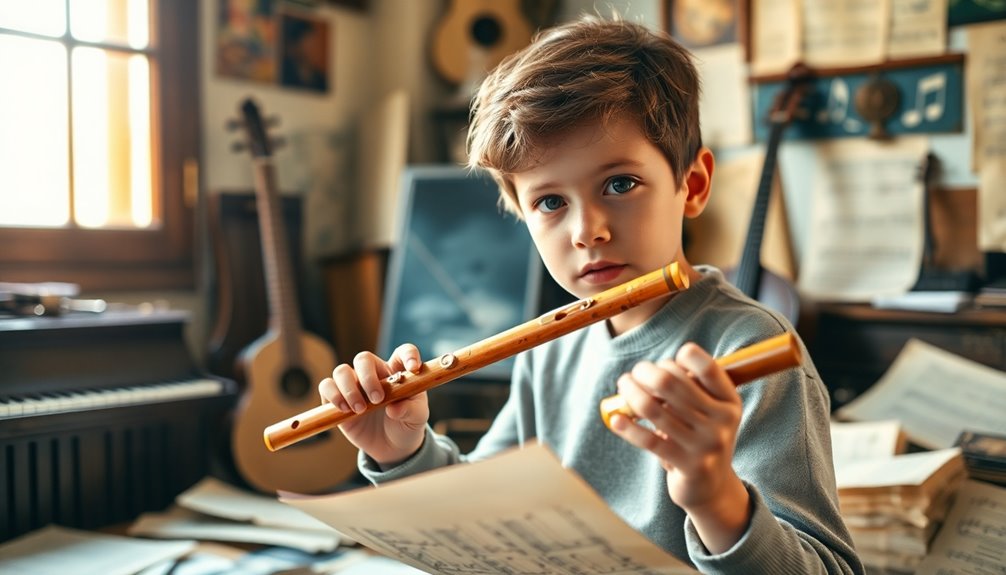
Jean-Pierre Rampal's early life and musical training laid the foundation for his extraordinary career as a flutist. Born into a family that valued music, he was exposed to various musical influences from a young age. His father, a skilled amateur flutist, ignited his passion for the instrument, nurturing his innate talent. You can see how this familial support and encouragement shaped his formative years, fostering a deep appreciation for the flute.
Rampal's early mentors played a vital role in his development. Studying under the guidance of renowned teachers, he honed his technique and artistry. One significant mentor was Marcel Moyse, a distinguished flutist who not only taught him the intricacies of flute playing but also instilled the importance of expression and emotion in music.
With Moyse's guidance, Rampal learned to blend technical prowess with heartfelt interpretation, a hallmark of his future performances. Regular maintenance of the flute, as taught by Moyse, ensured that Rampal could achieve optimal sound quality throughout his career.
Rampal's education didn't stop at mastering the flute; he immersed himself in the broader world of music. He explored different genres and styles, allowing diverse musical influences to inform his work. This multidisciplinary approach enriched his understanding of music and helped him develop a unique voice as a flutist.
Rise to International Fame

Rampal's dedication to refining his craft and embracing diverse musical influences set the stage for his ascent to international fame. As you explore his journey, you'll notice that he emerged during a pivotal moment—the flute renaissance of the mid-20th century. This era saw a growing appreciation for the flute's versatility, and Rampal became a key figure in showcasing its potential.
His participation in international competitions played a significant role in his rise. These events not only honed his skills but also expanded his network. Winning prestigious contests helped to elevate his profile, allowing him to connect with influential musicians and conductors. Each performance was an opportunity to display his unique sound, characterized by its vibrancy and expressiveness.
Rampal's charisma and stage presence captivated audiences worldwide, drawing them into the enchanting world of the flute. He didn't just play; he told stories through his music, inviting listeners to feel every note. By the time he made his debut with major orchestras, he'd already established a reputation as a virtuoso, blending classical tradition with contemporary styles.
As you reflect on his rise, it becomes clear that Rampal's influence extended beyond mere performances. He inspired a generation of flutists to embrace their artistry, transforming the flute into a celebrated instrument on the global stage. His mastery of breath control was instrumental in enhancing musical expression, allowing him to deliver captivating performances that resonated deeply with audiences.
His legacy continues to resonate, reminding us that passion, dedication, and a willingness to explore new horizons can lead to extraordinary achievements.
Innovations in Flute Performance
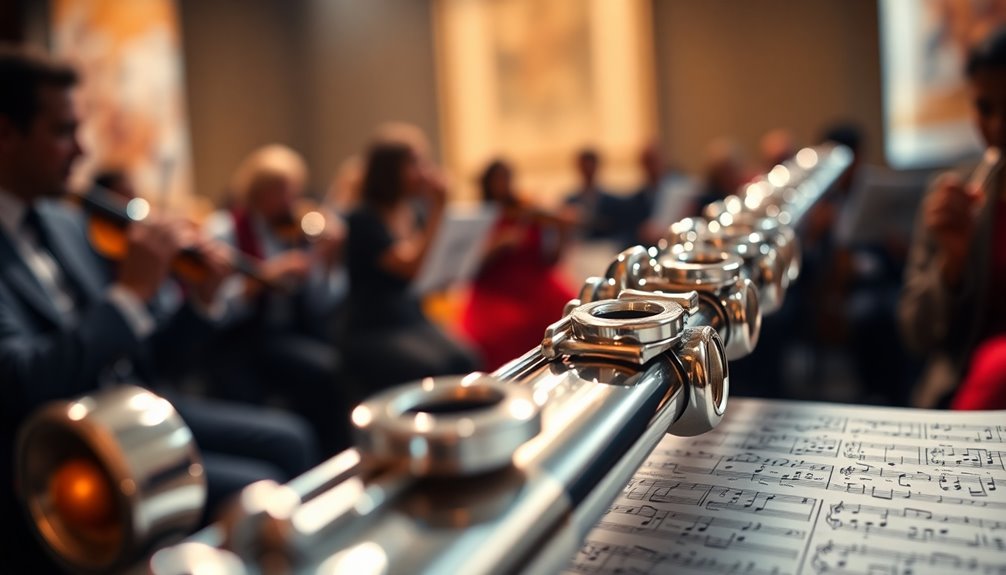
The innovations in flute performance during the mid-20th century revolutionized how the instrument was perceived and played, with Jean-Pierre Rampal at the forefront of this transformation. You'll find that Rampal didn't just elevate the flute's status; he opened doors to a world brimming with possibilities.
His embrace of extended techniques—like multiphonics, flutter tonguing, and harmonics—expanded the expressive range of the flute, allowing performers to explore new soundscapes.
As you investigate the contemporary repertoire, you'll notice how Rampal's influence encouraged composers to write innovative and challenging pieces specifically for the flute. His collaborations with modern composers brought forth works that pushed the boundaries of traditional playing, inviting flutists to embrace a broader palette of sounds.
These developments not only modernized the flute's role within orchestras but also established it as a solo instrument capable of holding its own in diverse musical settings.
You might appreciate how Rampal's charismatic performances and technical prowess inspired countless musicians to experiment with their own interpretations. By integrating these extended techniques into their playing, flutists began to carve out their unique voices, fostering a sense of community that thrives on shared exploration and creativity.
This shift in perspective has made the flute more accessible and appealing, inviting both seasoned players and newcomers to engage in a vibrant dialogue about its limitless potential. Additionally, Rampal's commitment to mastering advanced techniques has paved the way for flutists to push the boundaries of traditional playing. In this way, Rampal's legacy continues to resonate, encouraging you to explore and innovate in your own flute journey.
Collaborations With Renowned Artists
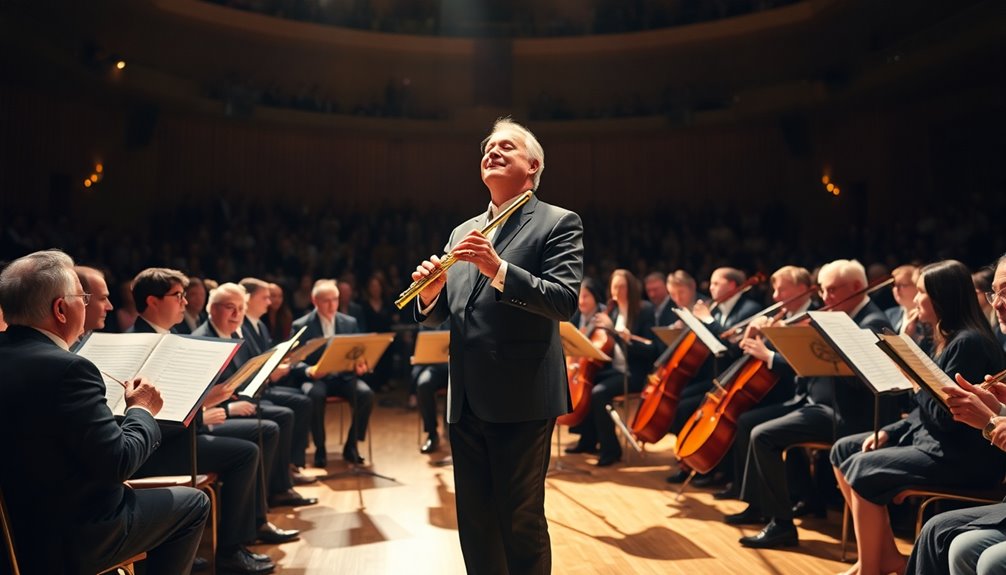
Frequently collaborating with renowned artists, Rampal not only showcased his exceptional talent but also enriched the musical landscape of the flute. His collaborative projects often transcended traditional genre boundaries, allowing him to explore innovative sounds and styles. Partnering with iconic musicians, such as pianist Clara Haskil and composer André Jolivet, Rampal brought fresh perspectives to flute performance, enchanting audiences worldwide.
These artistic partnerships were essential in elevating the flute's status within classical music. Through these collaborations, you can see how Rampal effectively demonstrated the flute's versatility, making it an integral part of diverse musical settings. By blending his unique sound with the expertise of other talented musicians, he created a synergy that resonated with listeners.
Rampal's willingness to explore new musical territories led to memorable recordings and performances that continue to inspire flutists today. His work with orchestras and chamber ensembles further highlighted the flute's potential, showcasing its expressive range. Each collaboration added a layer of depth to his artistry, making it clear that music is a collective experience. Consistent articulation enhances the clarity and expressiveness of his performances.
As you investigate Rampal's extensive discography, you'll find that these artistic partnerships contributed greatly to his legacy. They not only enriched his own musical journey but also fostered a sense of community among musicians.
In a world where connection is essential, Rampal's collaborations remind us that music is best when shared, creating bonds that transcend time and place.
Contributions to Classical Music
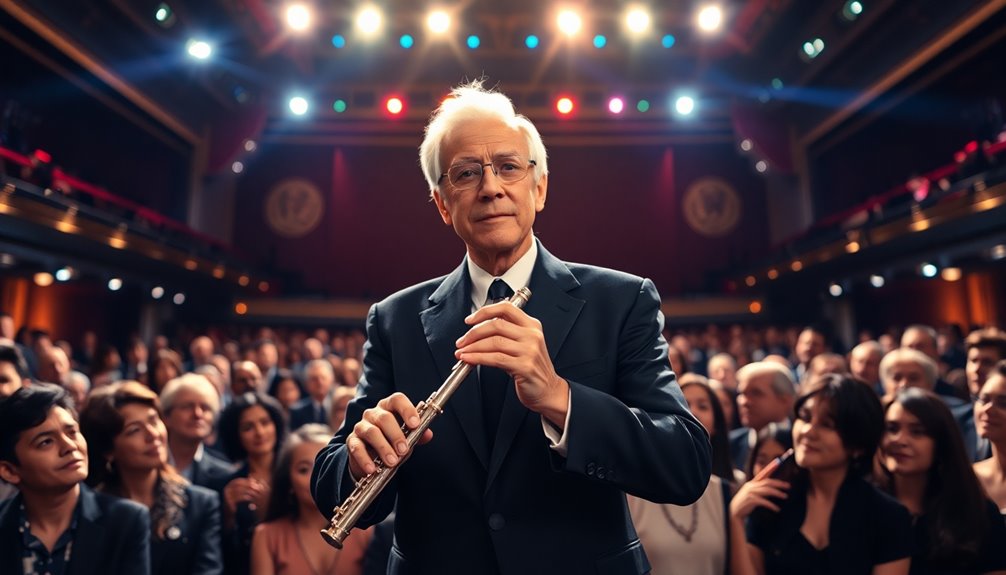
Innovation in classical music often stems from artists who push boundaries, and Jean-Pierre Rampal was a prime example of this phenomenon. His contributions to classical music, particularly in enhancing the flute's status, are undeniable. You can appreciate how Rampal transformed the flute repertoire and musical interpretation, making the instrument a crucial part of orchestras and solo performances alike.
Consider these key contributions:
- Expansion of Flute Repertoire: Rampal dedicated himself to commissioning and premiering new works, which enriched the existing flute repertoire considerably. This not only showcased the flute's versatility but also encouraged other composers to explore its potential.
- Musical Interpretation: His unique approach to musical interpretation brought a fresh perspective to traditional pieces. Rampal emphasized emotionality and nuance, allowing audiences to connect with the music on a deeper level.
- Flute as a Solo Instrument: By frequently performing as a soloist, he elevated the flute's profile within the classical music community. Rampal's performances proved that the flute could convey a wide range of emotions and technical complexity.
- Educational Outreach: Rampal was passionate about teaching and sharing knowledge. His masterclasses and workshops inspired countless musicians and nurtured a new generation of flutists.
Through these contributions, Rampal forged a lasting legacy that transformed classical music and solidified the flute's place in the spotlight. His work resonates with musicians and audiences alike, fostering a sense of belonging within the world of classical music. Additionally, his influence on modern composers paved the way for innovative approaches to flute music, encouraging experimentation with techniques and styles.
Influence on Future Generations
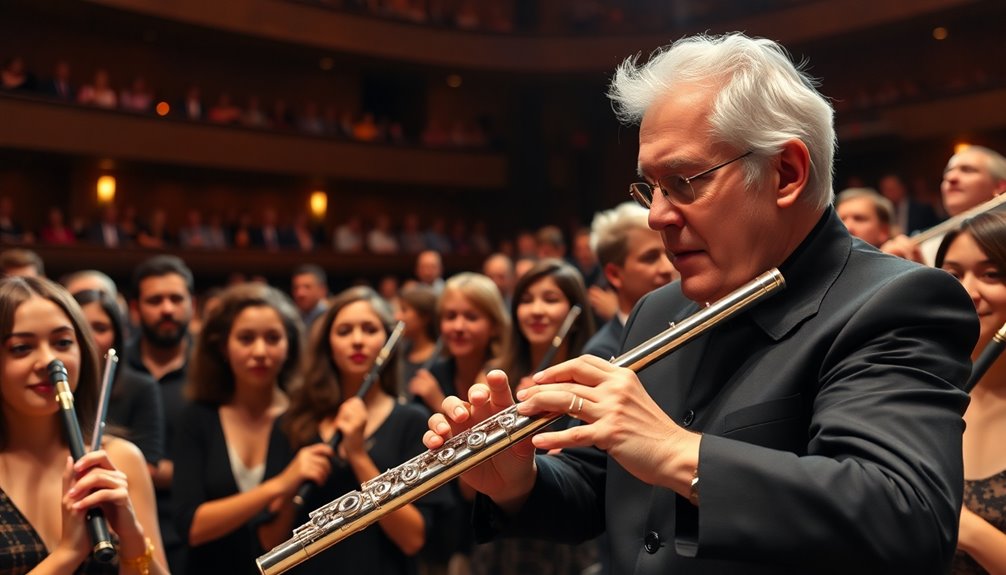
While many artists leave their mark, Jean-Pierre Rampal's influence on future generations of flutists is particularly profound. His innovative approach to flute pedagogy reshaped the way instructors teach and students learn the instrument. By emphasizing expressive tone and musicality, he inspired countless flutists to prioritize emotional connection over mere technical proficiency. You can see this shift in teaching methods in music schools today, where Rampal's principles continue to resonate.
Rampal's recordings and performances serve as a rich source of musical inspiration for aspiring flutists. When you listen to his interpretations of classical and contemporary pieces, you're not just hearing music; you're experiencing a unique expression of artistry that encourages you to explore your own voice. His ability to blend genres and embrace collaboration with other musicians broadens your musical horizons, reminding you that the flute can transcend traditional boundaries.
Moreover, Rampal's dedication to accessibility in music has paved the way for future flutists to engage with a wider audience. By championing the flute in various contexts, from solo performances to chamber music, he's shown you that the flute can shine in any setting. This openness invites you to find your niche and share your passion with the world. Diverse repertoire allows flutists to explore different styles and enhance their technical abilities, echoing Rampal's own musical journey.
In essence, Rampal's legacy isn't just about his own achievements; it's about fostering a sense of community among flutists. His impact encourages you to connect with others, grow as a musician, and carry the spirit of innovation into the future.
Global Tours and Outreach
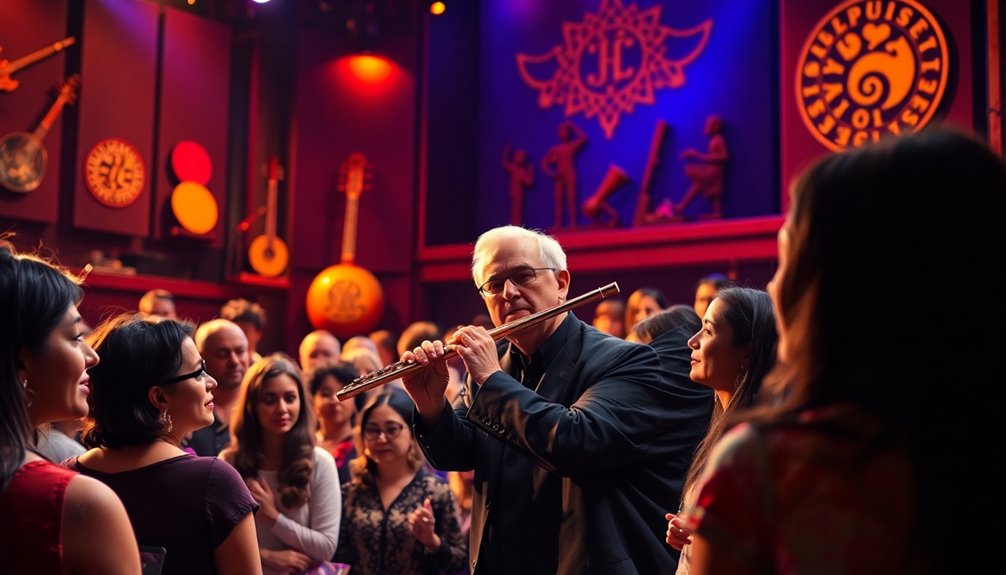
Rampal didn't just influence flutists through teaching and recordings; he also expanded the reach of the flute worldwide with his global tours and outreach efforts. His dedication to cultural exchange took him to various countries, where he not only showcased his exceptional talent but also built bridges between diverse musical traditions.
You can appreciate how Rampal's global outreach transformed the perception of the flute and its place in the world of music.
Here are some key aspects of his outreach initiatives:
- International Collaborations: By performing with musicians from different genres, Rampal showcased the flute's versatility and adaptability, inviting audiences into an inclusive musical dialogue.
- Master Classes and Workshops: He conducted numerous master classes worldwide, sharing his expertise and passion for the flute, which inspired countless aspiring musicians.
- Cultural Festivals: Rampal's participation in various cultural festivals allowed him to highlight the flute's role in different musical contexts, fostering a greater appreciation for this instrument.
- Educational Outreach: Through partnerships with schools and music organizations, he advocated for music education, emphasizing the importance of nurturing future generations of musicians. Additionally, his efforts contributed to building community bonds through shared musical experiences, further enriching the cultural landscape.
Recording Legacy and Discography
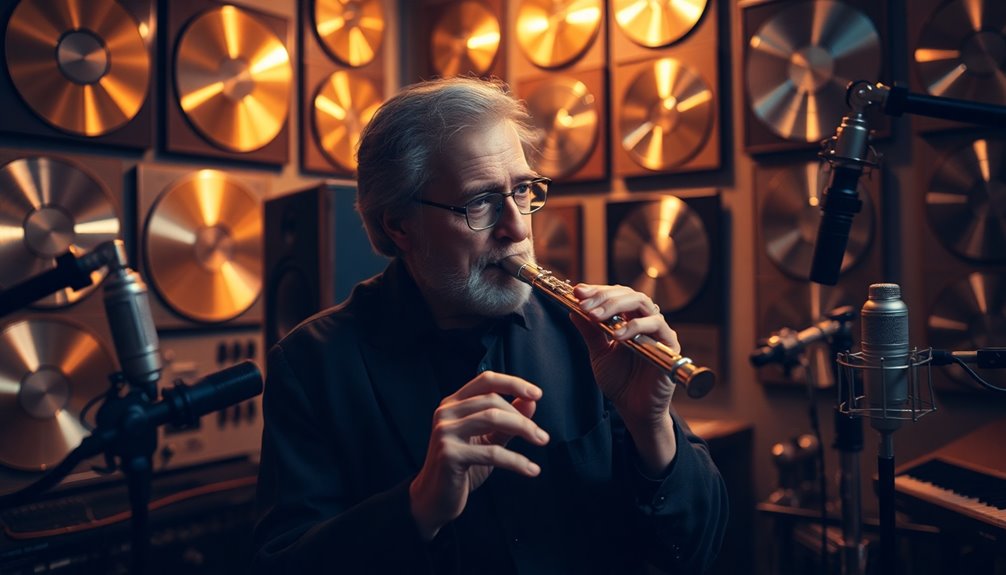
Through a remarkable array of recordings, Jean-Pierre Rampal not only captured the essence of the flute but also revolutionized its presence in classical music. His innovative recording techniques brought the instrument to life, making it accessible and appealing to a wider audience. Each album serves as a reflection of his artistry and dedication, showcasing his ability to infuse emotion into every note.
Rampal's discography analysis reveals a diverse catalog that spans various styles and genres, highlighting his versatility. With over 200 recordings to his name, he paved the way for future flutists, demonstrating the flute's potential beyond traditional classical boundaries. His impact on the flute's popularity can be seen in the rise of beginner flute brands, making the instrument a favored choice for new musicians.
Here's a snapshot of some key recordings that shaped his legacy:
| Album Title | Year Released | Significance |
|---|---|---|
| *Flute Concertos* | 1952 | Introduced the flute concertos to new audiences. |
| *Mélodies Françaises* | 1965 | Celebrated French music, enriching cultural heritage. |
| *Mozart Flute Quartets* | 1978 | Reinforced the flute's role in chamber music. |
Each entry in Rampal's discography is more than just a recording; it's a chapter in the story of the flute's resurgence in classical music. By analyzing these works, you can appreciate how Rampal didn't just play the flute—he transformed it, connecting listeners to its beauty and depth in ways that continue to resonate today.
The Flute in Different Cultures
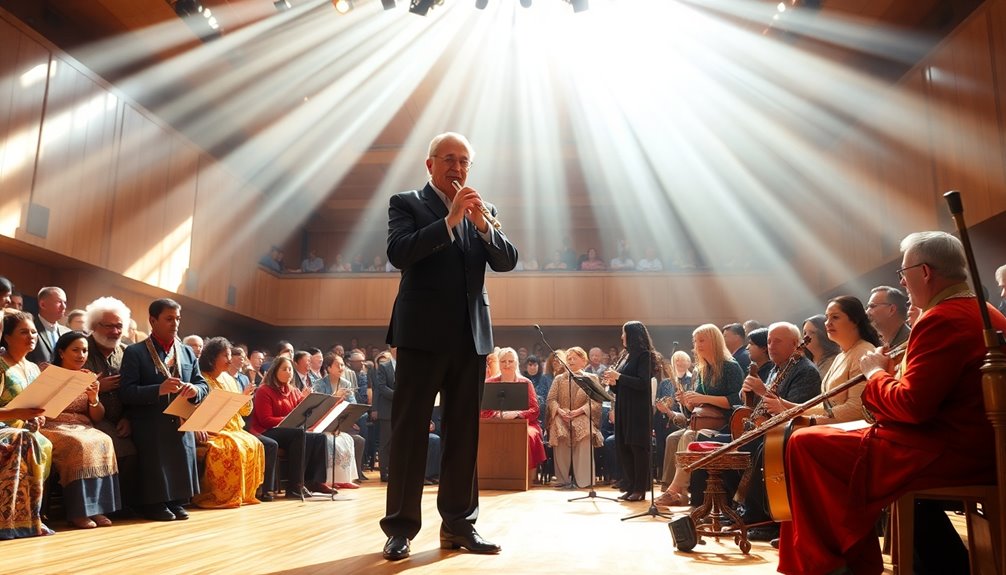
The flute's influence extends far beyond the classical music domain, resonating in diverse cultures around the globe. You might find it fascinating how this instrument adapts and transforms, reflecting the unique identities of different regions.
Each culture imbues the flute with its own significance, making it a crucial symbol of heritage and tradition.
Here are some notable examples of the flute's cultural significance and regional styles:
- Andean Music: In countries like Peru and Bolivia, the pan flute, or "siku," plays a crucial role in traditional festivities, invoking the spirits of nature and bringing communities together.
- Indian Classical Music: The bansuri, a bamboo flute, is integral to Indian classical music, often associated with the divine, especially in the context of Lord Krishna's tales, illustrating its spiritual importance.
- Irish Folk Music: The wooden flute is a staple in Irish traditional music, fostering a sense of belonging and community through lively jigs and reels during social gatherings.
- Japanese Music: The shakuhachi, a bamboo flute, is steeped in Zen philosophy, used in meditation and traditional ceremonies, showcasing the instrument's deep cultural roots. Additionally, the craftsmanship and cultural significance of flutes vary by region, influencing their design and use.
Lasting Impact on Music Education
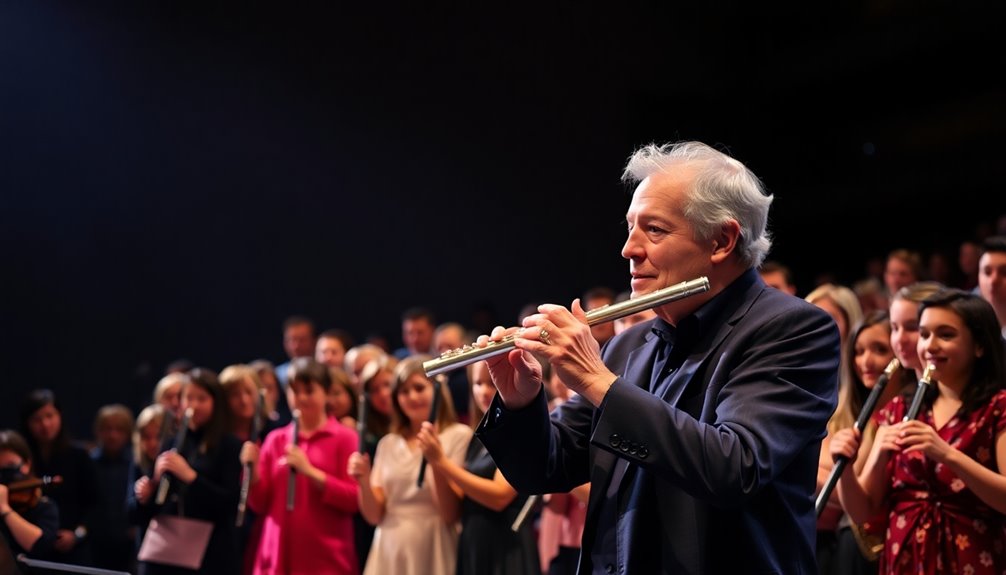
With its versatility and expressive capabilities, the flute has made a significant mark on music education worldwide. You mightn't realize it, but Jean-Pierre Rampal's influence extends beyond solo performances; he's transformed music pedagogy, shaping how flute techniques are taught globally. His dedication to the instrument inspired countless educators to embrace the flute not just as an orchestral tool but as a solo voice, worthy of individual expression.
Rampal emphasized the importance of technical mastery and emotional connection in flute playing. His innovative approach encourages you to investigate different styles, pushing the boundaries of traditional pedagogy. You'll find that his methods foster a sense of belonging among students, inviting them to connect not only with the music but also with each other.
By creating a community around flute playing, he paved the way for collaborative learning experiences that resonate with aspiring musicians. Moreover, Rampal's recordings serve as a rich resource for educators and students alike, offering insights into interpretation and expression. In addition, he highlighted the significance of smooth and responsive mechanisms, which facilitate learning and enhance playability for beginners.
As you explore his techniques, you can develop a deeper understanding of tone production and phrasing, which are essential in shaping your musical identity. Ultimately, Rampal's legacy reinforces the idea that music education isn't just about mastering an instrument; it's about fostering a lifelong passion for music.
Through his influence, you're not merely learning flute techniques; you're joining a vibrant global community that celebrates the artistry and joy of flute playing.
Frequently Asked Questions
What Specific Techniques Did Rampal Use to Enhance Flute Playing?
To enhance your flute playing, focus on breath control and tone production.
Rampal mastered the use of breath support, allowing him to sustain notes and create a rich, full sound. By incorporating dynamic variations, he brought life to his performances.
Experiment with different embouchures to see how they affect your tone.
How Did Rampal Influence Contemporary Flute Repertoire?
Rampal greatly influenced contemporary flute repertoire through his innovative flute collaborations and commitment to repertoire expansion.
By working with diverse composers and musicians, he introduced fresh perspectives and techniques, enriching the flute's role in classical music.
You'll find that his efforts not only created new works but also inspired a generation of flutists to explore unconventional pieces, fostering a sense of community among players who seek to elevate the flute's presence in modern compositions.
What Awards Did Jean-Pierre Rampal Receive During His Career?
You might think awards are just shiny trinkets for the shelf, but for Jean-Pierre Rampal, they're a tribute to his extraordinary talent.
Throughout his illustrious career, he racked up numerous accolades, including the prestigious Légion d'Honneur and a Grammy Award.
These lifetime achievements not only highlight his musical genius but also his role in elevating the flute's status in classical music.
Clearly, greatness isn't just celebrated; it's awarded, and Rampal's legacy shines bright.
Did Rampal Ever Compose Music for the Flute?
While Jean-Pierre Rampal is celebrated for his flute performances, he didn't primarily compose music.
However, his Rampal compositions often showcased the flute's capabilities, enriching its legacy.
You'll find that his interpretations of existing works brought new life to the flute repertoire, inspiring countless musicians.
Rampal's influence extends beyond performance; his recordings and collaborations helped elevate the instrument, making it more prominent in classical music and ensuring its place in the hearts of many.
How Did Rampal's Personal Life Affect His Music Career?
Rampal's personal life greatly shaped his music career. His musical upbringing, deeply rooted in a supportive family, fostered his passion for the flute.
With encouragement from loved ones, he pursued his dream relentlessly, blending personal experiences with his art.
This connection not only enriched his performances but also allowed him to resonate with audiences on a profound level.
You can see how his background and support system fueled his artistic journey and success.
Conclusion
To sum up, Jean-Pierre Rampal's influence on the flute transcends borders, showcasing its versatility across cultures. Did you know that he recorded over 200 albums throughout his career? This staggering number not only highlights his dedication but also his role in popularizing the flute in both classical and contemporary music. Rampal's legacy endures, inspiring countless musicians and enriching music education, ensuring that the flute will continue to shine brightly in the global music scene.

